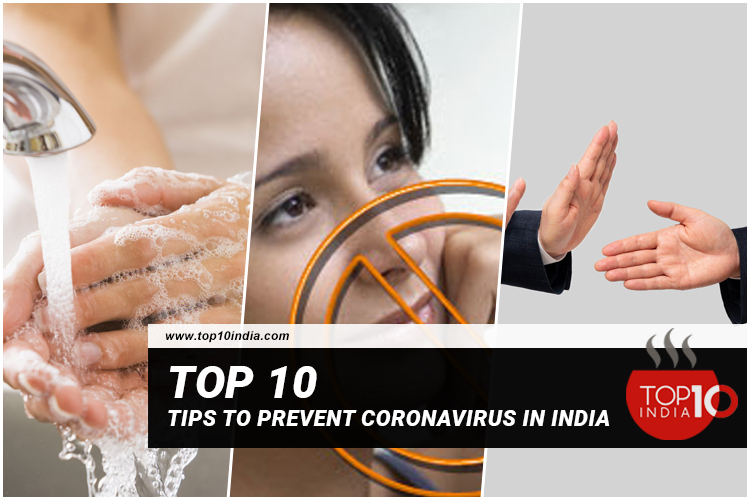Top 10 Tips To Prevent Coronavirus In India: To secure yourself from contracting and transmitting SARS-CoV-2, follow the instructions.
Top 10 Tips To Prevent Coronavirus In India
- Wash your hands often and thoroughly.
Wash your hands for at least 15-20 seconds with warm water and soap. You can use Antibacterial and antiviral soap.
When you can’t wash your face, use hand sanitizer.
2.Keep your hands away from your face.
SARS-CoV-2 can survive for up to 72 hours on some surfaces. If you touch a surface like this, you will get the virus on your hands.
Handle your phone like a doorknob at the gas pump
Avoid rubbing your mouth, nose, or eyes, as well as any other part of your face or head. Biting your fingernails is also a bad idea. This can allow SARS-CoV-2 to spread and infect from your hands to your body.
- For the time being, refrain from shaking hands or kissing people.
Avoid touching other people in the same way. SARS-CoV-2 can be transmitted from one human to another via skin-to-skin touch.
- Don’t share personal items
At all cost d not share personal items like:
- Hair combs
- Tooth Brush
- makeup
- Mobile phones
It’s also mandatory not to share straws and eating utensils. Teach children that their reusable cups, straw, and other dishes are just for their personal use.
- When you sneeze or cough, protect your nose and mouth.
In the nose and mouth, SARS-CoV-2 is present in large quantities. This means that when you cough, sneeze or speak, air droplets will carry it to other people. It can also land on hard surfaces and spend up to three days there.
To keep your hands as clean as possible, use a tissue or sneeze into your elbow. Regardless, wash your hands thoroughly after sneezing or coughing.
- Disinfect and clean surfaces
Clean hard surfaces in your home with alcohol-based disinfectants, such as:
- furniture toys
- door handles
- countertops
Clean your phone, laptop, and everything else you use daily at least once a day.
After bringing groceries or packages into your home, disinfect the room.
In addition to disinfecting surfaces, clean with white vinegar or hydrogen peroxide solutions.
- Pay attention to physical (social) distance.
If you have the SARS-CoV-2 virus, it will be present in large quantities in your spit (sputum).
Staying at home and working remotely when possible is also a form of physical (social) distancing.
If you have to go out for something, keep a 6 foot (2 m) distance from other people. You can spread the virus by talking to someone who is near you.
- Do not congregate in groups.
When you’re in a meeting or group, you’re more likely to come into direct contact with the virus.
This involves avoiding all places of worship where you may be forced to sit or stand too close to another worshipper. It also implies not meeting each other in the beach or the parks.
- It’s best not to eat or drink in public locations.
It’s not the best time to eat out. This means staying away from restaurants, coffee shops, pubs, and other eating establishments.
It can have become airborne due to the presence of other people in the region.
Select food items that have been cooked thoroughly and or you can be reheated.
Coronaviruses are killed by high heat (at least 132°F/56°C, according to one recent, not-yet-peer-reviewed lab study).
This means that cold foods from restaurants, as well as all food from buffets and open salad bars, can be better avoided.
- Hand-wash new groceries
Before eating or cooking any produce, wash it thoroughly under running water.
On fruits and vegetables, the CDCTrusted Source and the FDATrusted Source advise against using soap, detergent, or an industrial produce wash. Before and after handling these things, make sure to wash your hands.
What makes these steps so crucial?
Since SARS-CoV-2 differs from other coronaviruses, including the one it most closely resembles, SARS-CoV, it’s critical to follow the guidelines to the letter.
Current medical research demonstrates why we must protect ourselves and others from the SARS-CoV-2 virus.
SARS-CoV-2 can cause more problems than other viruses in the following ways-;
- You may not be experiencing any symptoms.
A SARS-CoV-2 infection may be transmitted or acquired without causing any symptoms. This means you could unintentionally spread it to more vulnerable people, making them very sick.
The virus can still be transmitted.
This indicates that those who were infected were aware of their condition and were able to prevent the spread of the disease.
- You may get sicker, faster
SARS-CoV-2 could make you sicker much sooner.
In China, doctors who checked 82 people for COVID-19 discovered that the viral load peaked 5 to 6 days after symptoms started.
This means that the SARS-CoV-2 virus can replicate and spread almost twice as quickly in people with COVID-19 disease as it can in people with other coronavirus infections.
- You may be infectious.
You may have the same viral load (number of viruses) in your body like someone who has serious symptoms even though you don’t have any symptoms.
This means you’re just as likely to spread COVID-19 as anyone who has it. Many different viruses in the past times created lower viral loads and only after symptoms surfaced.
Last but not least
It is important to take these preventive measures seriously in order to stop the virus from spreading.
Following these instructions, practicing good hygiene, and encouraging your friends and family to do the same would go a long way toward preventing the spread of SARS-CoV-2.








Be First to Comment